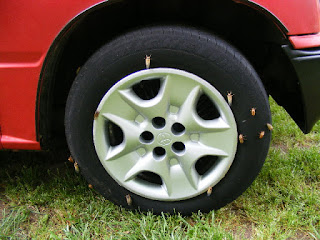Thirteen years ago, in the sleepy little town of Van Wyck, South Carolina - right across the North Carolina border , a cacophony of strange noises filled the air. Cars stopped at the corner where we live and the drivers would lift their hoods to see if their car was falling apart, then glance around nervously when they realized the noise wasn't coming from their car.. Animals who normally sleep outside suddenly wanted to stay inside. We had just put up a fenced in area with a brick patio in the back yard but the sound drove us so crazy we couldn't bear to be outside to use it. We were held hostage in our own home. What were these creepy little critters that packed such a loud punch? It was the year of Cicadas and thirteen years later, it looks like we're in for it again.
I had always heard about the Periodical Cicada but had never seen them in action until 1998. These are not to be confused with the annual cicadas that are very pleasant to hear on warm summer evenings. The cicada's in our area have a thirteen year life cycle. If you are lucky enough to have them, not only will you have a about a million holes in your ground, your ears will be ringing for days.
When the young nymphs hatch, they dig themselves into the ground. They spend their life in underground burrows and go through their growth stages and finally come out to get rid of their ugly little bodies and get new ones. They do not live long after their mating rituals - they die soon after the females lay their eggs. That doesn't seem very fair. If I had been given a brand new body, I think I would want to use it awhile on this side of the dirt instead of under it.
I've made some pictures outside this week to show part of their life cycle.
 |
| Notice the burrows under one of our trees when I pulled back the plastic from under our pine straw. In the hole on the top left you can see one of the nymphs whose shell has finally hardened enough to come out of the ground. He is in a beetle-like stage now. Before they harden, they are very soft and defenseless. |
 |
| They climb up on things - especially trees - and shed their shell. See this one emerging from the beetle-like stage. They are very vulnerable at this stage. They are easy prey for ants, wasps, and birds. The ones to the right are just shells that will remain stuck to the tree for many months - even years if you don't brush them off. |
 |
| Here you can see an empty shell, a freshly molted cicada above it, and finally at the top you'll see one that has been out a few hours and ready to fly. |
|
Over the next few pictures you will see how they climb on ANYTHING to start their new life cycle:
 |
| Even my pretty flowers |
 |
| All over the trees |
 |
| And even on the wheels of cars! The car itself is too slick for them to stick to. |
 |
| And finally, Olive enjoying a freshly molted tasty morsel. They even make great chicken food! |
After they all hatch out, they will fly into the top of the trees and start their mating cries - The females make a noise like a normal summertime cicada but the males are the ones responsible for the loud whirring background noise. His "song" comes from a pair of vibrating structures behind his back wings. There's some funny things I could say here, but I'll save them for another time.
I have recorded the sounds on my Flip Video and uploaded them to youtube - just go to the following link. You may have to copy and paste. It's worth hearing - it's very noisy. Just turn up your volume to get the full effect.
http://www.youtube.com/watch?v=FriiLvK-5FE
We will probably have to put up with the sound for another week or two - it will get much louder as they are still migrating out of the ground by the thousands - then they'll be laying their eggs on twigs, the twigs will fall onto the ground, the hatched eggs will burrow their way anywhere between 1 and 8 feet under the ground and in the year 2024, we'll hear them again - if we're not deaf from their current noise making, that is.








No comments:
Post a Comment
I love to hear your comments!